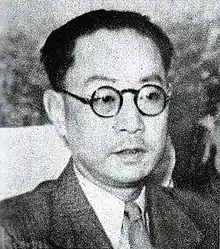Zhou Fohai
Zhou Fohai (Chinese: 周佛海; pinyin: Zhōu Fóhǎi; Wade–Giles: Chou Fo-hai; Hepburn: Shū Futsukai; May 29, 1897 – February 28, 1948) was a Chinese politician and the second-in-command of the Executive Yuan in Wang Jingwei's collaborationist Reorganized National Government of the Republic of China during the Second Sino-Japanese War.
Zhou Fohai 周佛海 | |
|---|---|
 Zhou in 1940 | |
| Vice President of the Republic of China (Wang Jingwei regime) | |
| In office March 1940 – August 1945 | |
| President | Wang Jingwei (1940–1944) Chen Gongbo (1944–1945) |
| Preceded by | Position Established |
| Succeeded by | Position Abolished |
| Minister of Finance (Wang Jingwei regime) | |
| In office March 1940 – August 1945 | |
| Preceded by | Position Established |
| Succeeded by | Position Abolished |
| Mayor of Shanghai | |
| In office December 1944 – August 1945 | |
| Preceded by | Chen Gongbo |
| Succeeded by | Wu Guozhen |
| Personal details | |
| Born | 29 May 1897 Hunan, Qing Empire |
| Died | 28 February 1948 (aged 50) Nanjing, Republic of China |
| Nationality | |
| Political party | Communist Party of China Kuomintang |
| Alma mater | Kyoto Imperial University |
Biography
Zhou was born in Hunan province, China, during the Qing dynasty, where his father was an official in the Qing administration. After the Xinhai Revolution, he was sent to Japan for studies, attending the Seventh Higher School Zoshikan (the predecessor of Kagoshima University), followed by Kyoto Imperial University. During his stay in Japan, he became attracted to Marxism, and on his return to China, became one of the founders of the Chinese Communist Party. He attended the First Congress in Shanghai in July 1921,[1] but quit the Communist Party in 1924 to join the Kuomintang. He was assigned as a secretary to the Public Relations Department of the central government, but maintained strong ties with the party's leftist clique, headed by Wang Jingwei and Liao Zhongkai. He strongly opposed Chiang Kai-shek’s Northern Expedition and Chiang Kai-shek’s conduct of the Second Sino-Japanese War.
After Wang Jingwei broke ranks with the Kuomintang during World War II and established the collaborationist Reorganized National Government of the Republic of China, Zhou soon followed. Within the new government, Zhou became Vice President, Minister of Finance and had control over part of the Nanjing regime army. He was also Minister of Police (until 1941) and became Mayor of Shanghai after Chen Gongbo in 1944. He also maintained secret contacts with the Nationalists in Chongqing.
At the end of World War II, Zhou was captured and taken to Chongqing where he remained in custody for nearly a year. He was then sent to Nanjing in Jiangsu Province where he stood trial for treason due to his wartime roles. At his trial, Zhou argued that, "In the first half of the period when I participated in the Nanjing government, I attempted, by keeping in touch with the enemy, to turn things to the advantage of my country; in the latter half, I tried to turn them against the enemy by maintaining contact with my country [the Chongqing government]." Nonetheless, Zhou was sentenced to death but this was commuted to life imprisonment by Chiang Kai-shek, after his wife had interceded for him. He suffered from heart and stomach problems while in prison and died on February 28, 1948, aged 50.
References
Citations
- "Dates with destiny for CPC". China Daily. 1 July 2011. Retrieved 8 August 2020.
Bibliography
- Barrett, David P.; Shyu, Lawrence N. (2001). Chinese Collaboration with Japan, 1932–1945: The Limits of Accommodation. Stanford University Press. ISBN 978-0-8047-3768-5.
- Boyle, John H. (1972). China and Japan at War, 1937–1945: The Politics of Collaboration. Harvard University Press. ISBN 978-0-8047-0800-5.
- Burns, Richard D.; Bennett, Edward M. (1974). Diplomats in Crisis: United States-Chinese-Japanese Relations, 1919–1941. Clio Press. ISBN 978-0-8743-6135-3.
- Chi, Hsi-sheng (1982). Nationalist China at War: Military Defeats and Political Collapse, 1937–1945. University of Michigan Press. ISBN 978-0-4721-0018-7.
- Hsiung, James C. (1992). China's Bitter Victory: The War with Japan, 1937–1945. M. E. Sharpe. ISBN 978-0-8733-2708-4.
- Mote, Frederick W. (1954). Japanese-Sponsored Governments in China, 1937–1945. Stanford University Press.
External links
- 周佛海 with photo
- A traitor's love nest